
The panelist summarizes the major findings from MARIPOSA-2 and their conclusions about amivantamab regimens improving outcomes in osimertinib-resistant NSCLC.

Your AI-Trained Oncology Knowledge Connection!


The panelist summarizes the major findings from MARIPOSA-2 and their conclusions about amivantamab regimens improving outcomes in osimertinib-resistant NSCLC.

This segment summarizes the pivotal efficacy and safety outcomes from the MARIPOSA-2 trial of amivantamab-based regimens in osimertinib-resistant EGFR-mutant NSCLC. It explores the clinical implications of these data and potential future research directions.

A comprehensive look at the safety data from the MARIPOSA-2 trial, including rates of adverse events, toxicities, and treatment modifications across the three regimens. Specific details are provided on adverse event types and grades by the treatment arm.

This segment focuses on the key efficacy data on progression-free survival, response rates, and duration of response from MARIPOSA-2.

In this segment the panelist reviews the baseline patient and disease characteristics across the three treatment arms in MARIPOSA-2.
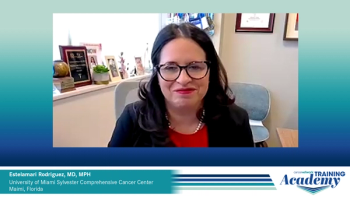
Estelamari Rodriguez, MD, MPH, presents a case of a 50-year-old African American woman, non-smoker, with pleural metastases; the panel discusses interstitial lung disease management, the use of antibody-drug conjugates, disease timing, and strategies for providing symptomatic relief, specifically considering drug holds if steroids only offer partial relief.
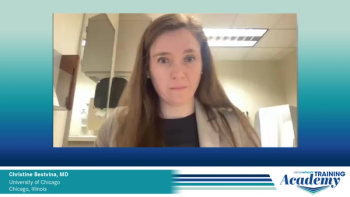
Christine Bestvina, MD, presents a case of a 34-year-old non-smoker diagnosed with Stage IIIA NSCLC after presenting with chest wall pain; the panel then explores their approaches to managing toxicities, including rashes and sores, by employing dose reductions and steroids to control adverse reactions.

Alexander Spira, MD, PhD, FACP, presents a case of a 45-year-old male with stage IV NSCLC, bone and liver metastases, and an EGFR exon 20 insertion; the panel then discusses their approach to treating brain metastases using stereotactic radiosurgery radiation therapy.
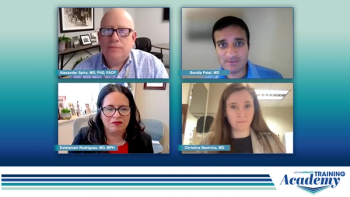
The panelists explore the importance of communicating with patients, nurses, and caregivers about potential adverse reactions and injection site reactions, while emphasizing the need to offer ongoing reassurance and support throughout the treatment journey.
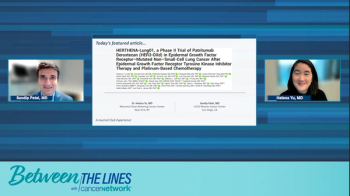
The panel discusses how HER3-directed therapy with patritumab deruxtecan may fit into the evolving treatment paradigm for EGFR-positive lung cancer as more data emerges.

Dr. Yu and Dr. Patel examine the safety profile of patritumab deruxtecan, including adverse event monitoring and management approaches to optimize patient outcomes.

The expert panel analyze results from the HERTHENA-Lung01 trial, discuss efficacy outcomes with patritumab deruxtecan in pretreated EGFR-mutant metastatic NSCLC.

Dr. Patel and Dr. Yu review the rationale for targeting HER3 as a novel approach to address acquired resistance in EGFR-mutant NSCLC.

Expert medical oncologists examine remaining unmet needs in managing EGFR-positive lung cancer, including overcoming resistance to initial EGFR-directed therapy. The panel discusses ongoing trials targeting these needs.

Dr. Yu and Dr. Patel provide an overview of current standards and recent advances in the treatment landscape for EGFR-mutated NSCLC, emphasizing the critical role of comprehensive genomic profiling in guiding optimal therapy selection and sequencing.

Patients with KRAS G12C-mutated non–small cell lung cancer who have brain metastases or intolerability of intravenous infusion may be more suitable to receive a small molecule inhibitor compared with chemotherapy, says Sandip P. Patel, MD.

Treatment with sotorasib or adagrasib appears to be more tolerable among patients with KRAS G12C-mutated non–small cell lung cancer compared with docetaxel, according to Sandip Patel, MD.

“KRAS is probably the most exciting area in clinical trials right now, not only in thoracic oncology but also pancreatic and colorectal cancer, where we’ve seen a lot of combination therapies. My view is the small molecule inhibitors are the base, not the ceiling.”

Cell therapy and vaccine approaches are among the several potential options for targeting KRAS in patients with KRAS G12C–mutated non–small cell lung cancer, says Sandip P. Patel, MD.
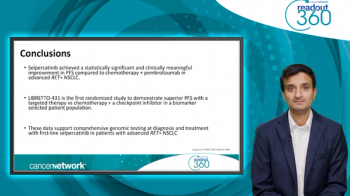
A medical oncologist discusses data from the LIBRETTO-431 clinical trial looking at first-line selpercatinib vs chemotherapy and pembrolizumab in RET fusion–positive NSCLC.

Sandip P. Patel, MD, reviews recent data from the PAPILLON study investigating amivantamab plus chemotherapy in the first line for patients with EGFR exon 20 insertion–mutated advanced NSCLC.

Before closing out his discussion on NSCLC, Sandip Patel, MD, shares his excitement for evolving targeted strategies and improved patient outcomes.

Focusing on the broader treatment armamentarium for EGFR-mutated NSCLC, Sandip Patel, MD, considers possible sequencing and combination strategies.

Sandip Patel, MD, highlights the use of afatinib and mobocertinib, respectively, to treat NSCLC with rare EGFR-mutation variants.

Insight on EGFR-mutated non–small cell lung cancer’s impact on treatment options and overall patient prognoses.

Expert perspectives on the current landscape of molecular profiling in patients with non–small cell lung cancer.
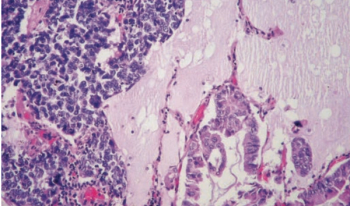
ONCOLOGY recently spoke with Dr. Sandip Patel about a potential novel therapeutic ap- proach to treating patients with neuroendocrine tumors.